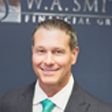Improve Your Physical and Financial Fitness
Whether you're focusing on your body or your budget, a holistic approach can help you feel better and live better.

Profit and prosper with the best of Kiplinger's advice on investing, taxes, retirement, personal finance and much more. Delivered daily. Enter your email in the box and click Sign Me Up.
You are now subscribed
Your newsletter sign-up was successful
Want to add more newsletters?
How do you rate your financial shape? After 20 years of helping people plan for retirement, I've learned there are some parallels between a person's financial fitness and physical fitness.
First, ask yourself if you keep track of the daily financial headlines and whether the inevitable market fluctuations make you uneasy or put you in a bad mood. You'd be amazed at how many people are like that. It's kind of like stepping on the scale every day when you are trying to lose weight. That can be a frustrating way to live.
Whether you're talking about financial or physical fitness, all of us can benefit from having a dependable professional to guide us, nudge us and offer new ideas.
From just $107.88 $24.99 for Kiplinger Personal Finance
Become a smarter, better informed investor. Subscribe from just $107.88 $24.99, plus get up to 4 Special Issues

Sign up for Kiplinger’s Free Newsletters
Profit and prosper with the best of expert advice on investing, taxes, retirement, personal finance and more - straight to your e-mail.
Profit and prosper with the best of expert advice - straight to your e-mail.
I hired a fitness trainer four years ago because, even though I had my own workout routine at the gym, it was stale. I always did the same stuff: lots of upper body work and barely any leg days. I wasn't crazy about cardio either. And I missed workouts when things got busy on the job.
My trainer changed everything. Now I get up at 5 a.m. every morning, do my pre-workout checklist, meet my trainer at 6 a.m. and crank out new and interesting workouts thanks to his plan. I show up every day because, if I don't, I still have to pay him, and I don't like giving money away!
Cardiovascular workouts are a lot like budget planning. Many people hate doing cardio, just as they hate creating a budget.
Put together a real budget; few people do so. When I ask clients how much money they need a month for basic necessities, they can't give me a number. Just as my trainer tells me I need to do cardio work, I tell my clients they need a budget.
When I build a plan for retirement, I break people's finances into two categories: the necessities and the discretionary spending. Examining exactly how you spend money can be a painful exercise, but it is pivotal to creating a solid retirement plan.
Now I love leg day at the gym. I used to avoid it. Leg day is similar to estate planning. People tend to avoid estate planning because it makes them think about the end of their own race. The last time they updated their will was when their children were born. Maybe they never even got around to drawing one up.
It's easy to put off leg day, and estate planning, by telling yourself you'll get to it, eventually. That's when my trainer, and an estate planning attorney, can help. It's so much easier when the coach tells you, "Okay, today is leg day. We're not going to avoid this any longer."
Eating right is like having the right retirement plan. If you eat better, you build muscle, you get stronger, and you can run farther with less fatigue.
To help can create a better retirement plan you should focus on five key elements:
If you commit to these goals for your money, then you'll earn an off day! The off day, physically, helps your body relax and recuperate. In the context of your finances, it means having more confidence when the stock market dips. Now you can comfortably take your eyes off those bad headlines.
Remember, you want to be able to focus more on your life and less on your money. Just as being physically fit makes you feel better and live better, you'll reap the same rewards from your efforts to become financially fit.
Bill Smith is CEO of W.A. Smith Financial Group and Great Lakes Retirement, Inc., as well as an Investment Adviser Representative and insurance professional. His firms focus on retirement planning and wealth management.
Dave Heller contributed to this article.
Profit and prosper with the best of Kiplinger's advice on investing, taxes, retirement, personal finance and much more. Delivered daily. Enter your email in the box and click Sign Me Up.

Bill Smith is the host of the television and radio show "Retirement Solutions." Author of "Knock Out Your Retirement Income Worries Forever." He is the CEO of W.A. Smith Financial Group and Great Lakes Retirement Inc. His firms specialize in retirement income planning, wealth management, wealth preservation and estate planning.
-
 Americans, Even With Higher Incomes, Are Feeling the Squeeze
Americans, Even With Higher Incomes, Are Feeling the SqueezeA 50-year mortgage probably isn’t the answer, but there are other ways to alleviate the continuing sting of high prices
-
 Hiding the Truth From Your Financial Adviser Can Cost You
Hiding the Truth From Your Financial Adviser Can Cost YouHiding assets or debt from a financial adviser damages the relationship as well as your finances. If you're not being fully transparent, it's time to ask why.
-
 How to Manage a Disagreement With Your Financial Adviser
How to Manage a Disagreement With Your Financial AdviserKnowing how to deal with a disagreement can improve both your finances and your relationship with your planner.
-
 Are You Honest With Your Financial Adviser? Why Hiding the Truth Can Cost You
Are You Honest With Your Financial Adviser? Why Hiding the Truth Can Cost YouHiding assets or debt from a financial adviser damages the relationship as well as your finances. If you're not being fully transparent, it's time to ask why.
-
 Missed Your RMD? 4 Ways to Avoid Doing That Again (and Skip the IRS Penalties), From a Financial Planner
Missed Your RMD? 4 Ways to Avoid Doing That Again (and Skip the IRS Penalties), From a Financial PlannerIf you miss your RMDs, you could face a hefty fine. Here are four ways to stay on top of your payments — and on the right side of the IRS.
-
 What Really Happens in the First 30 Days After Someone Dies (and Where Families Get Stuck)
What Really Happens in the First 30 Days After Someone Dies (and Where Families Get Stuck)The administrative requirements following a death move quickly. This is how to ensure your loved ones won't be plunged into chaos during a time of distress.
-
 5 Retirement Myths to Leave Behind (and How to Start Planning for the Reality)
5 Retirement Myths to Leave Behind (and How to Start Planning for the Reality)Separating facts from fiction is an important first step toward building a retirement plan that's grounded in reality and not based on incorrect assumptions.
-
 I'm a Financial Adviser: Silence Is Golden, But It Hurts Your Heirs More Than You Think
I'm a Financial Adviser: Silence Is Golden, But It Hurts Your Heirs More Than You ThinkTalking to heirs about transferring wealth can be overwhelming, but avoiding it now can lead to conflict later. Here's how to start sharing your plans.
-
 Will Your Children's Inheritance Set Them Free or Tie Them Up?
Will Your Children's Inheritance Set Them Free or Tie Them Up?An inheritance can mean extraordinary freedom for your loved ones, but could also cause more harm than good. How can you ensure your family gets it right?
-
 I'm a Financial Adviser: This Is the Real Key to Enjoying Retirement With Confidence
I'm a Financial Adviser: This Is the Real Key to Enjoying Retirement With ConfidenceA resilient retirement plan is a flexible framework that addresses income, health care, taxes and investments. And that means you should review it regularly.
-
 Buy and Hold … or Buy and Hope? It's Time for a Better Retirement Planning Strategy
Buy and Hold … or Buy and Hope? It's Time for a Better Retirement Planning StrategyOnce you're retired, your focus should shift from maximum growth to strategic preservation and purposeful planning to help safeguard your wealth.